Mar 8, 2025 – 20th Day of the 100-Day Dharma Talk, 1080 Prostration Practice, Balsim Practitioner Precept Ceremony
Hello. Today is the 20th day of Venerable Pomnyun Sunim’s 100-Day Dharma Talk. Today is a day to practice diligently while reflecting on the Dharma talks heard over the past week.
After completing his morning practice and meditation, Sunim headed to the Jungto Social and Cultural Center. On the third floor of the Dharma hall, many people were participating in the 9 AM morning service, praying with sincere devotion.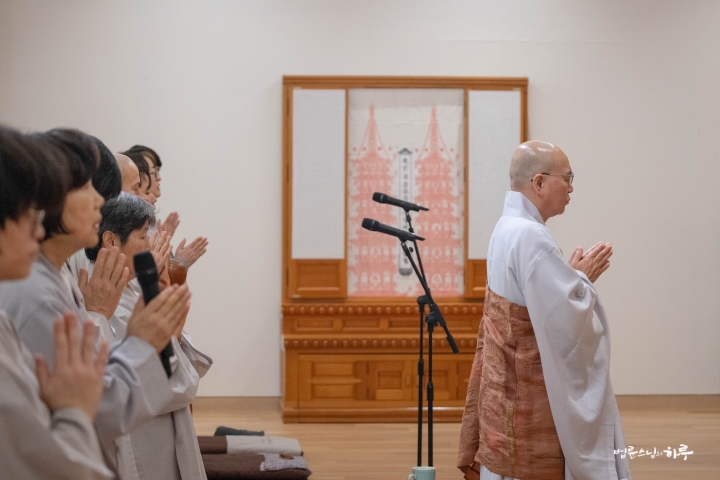
After the morning prayer, the space was briefly rearranged. About 240 people filled the hall to participate in the practice session. At 10:15 AM, after reciting the Three Refuges and the Heart Sutra, the assembly requested Dharma teachings from Sunim with three full bows. Sunim gave a Dharma talk on the proper mindset for practice.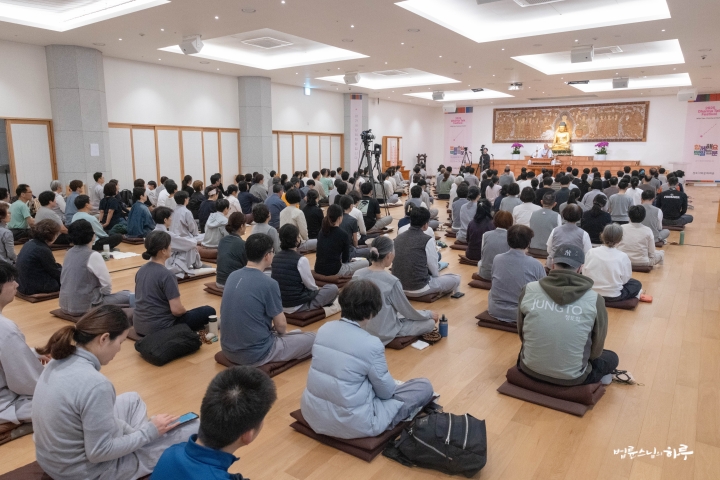
“Diligent practice means steadily moving forward without rest. Diligent effort is one of the eight practices in the Noble Eightfold Path of early Buddhism, and it is also one of the six practices in the Six Paramitas, the Mahayana Bodhisattva path. This shows how important it is to continue our practice consistently without interruption.
However, diligent practice isn’t just about working hard. In Buddhism, there are concepts of wholesome dharmas and unwholesome dharmas. These aren’t simply dividing good and evil. What hinders our progress toward liberation and nirvana is considered ‘unwholesome,’ and what helps us is considered ‘wholesome.’ The biggest obstacle to liberation and nirvana is laziness. Indolence, negligence, lethargy, and powerlessness are collectively called unwholesome dharmas.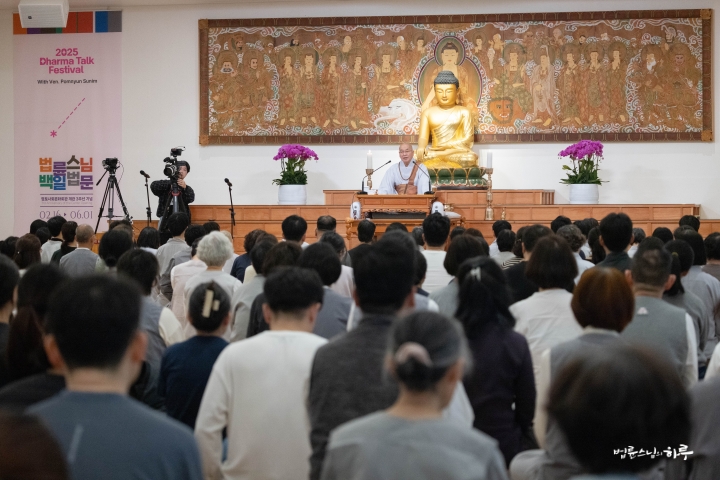
What Should I Do When I Face Difficulties in My Practice?
Our karmic tendencies have been formed through habits repeated over a long period of time. As a result, certain behaviors happen automatically without our awareness. If these behaviors are harmful to us, we need to eliminate these karmic tendencies and habits. However, because they arise unconsciously, they are not easy to change. We see the results of our karma and resolve, ‘I must change this now,’ but after a few days, we return to our original habits. When facing difficulties during practice, thoughts arise like ‘What if I get hurt?’, ‘What if I get sick?’, or ‘What if I die?’ These thoughts make us stop our practice. Therefore, to eliminate karmic tendencies, we need the determination that ‘I’m willing to die!’ We need a great resolute mind that is prepared even for death.
However, determination and resolution alone are not enough to eliminate karmic tendencies. In practice, there are times when things go well and times when they don’t. There are times when we don’t want to practice and times when we do. As we practice, our mind may fluctuate, behaving differently from our initial intention. Nevertheless, we must continue steadily without being constrained by such mental states.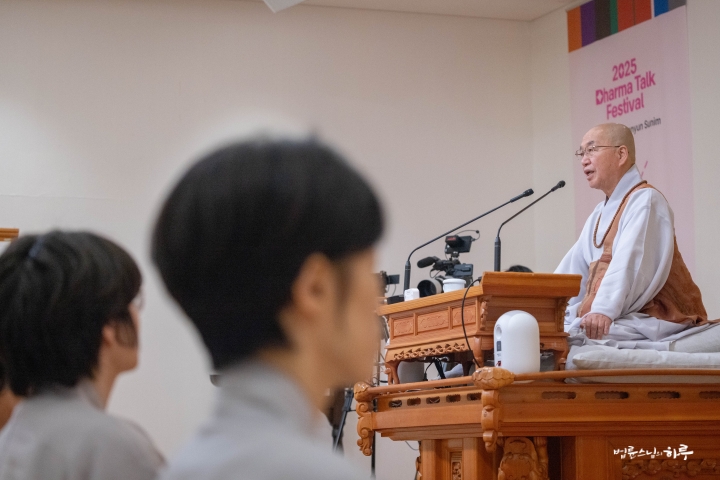
When thinking about hiking a mountain, we start with light, joyful steps on flat ground. However, as we climb higher, we encounter streams, forests, and steep slopes. Our legs may ache, and we might feel like turning back. But if we endure and reach the ridge, we experience the pleasure of hiking and our mood improves. Yet when we set off again, we may once more feel exhausted, regretful, and want to give up. In our spiritual practice, we go through these cycles repeatedly. If we follow these fluctuating emotions, afflictions arise. Instead, we should recognize that “this is just how the mind naturally works” and continue on our chosen path without being controlled by emotions. Whether it’s difficult or comfortable, steep or requiring us to crawl or use ropes, we must simply keep going. With persistence, we eventually reach the summit. Once at the peak, it no longer matters whether the path was steep or had streams. During the climb, we have various thoughts because it’s challenging, but once we reach the top, we realize that the process—whatever it entailed—was perfectly fine and not problematic at all. 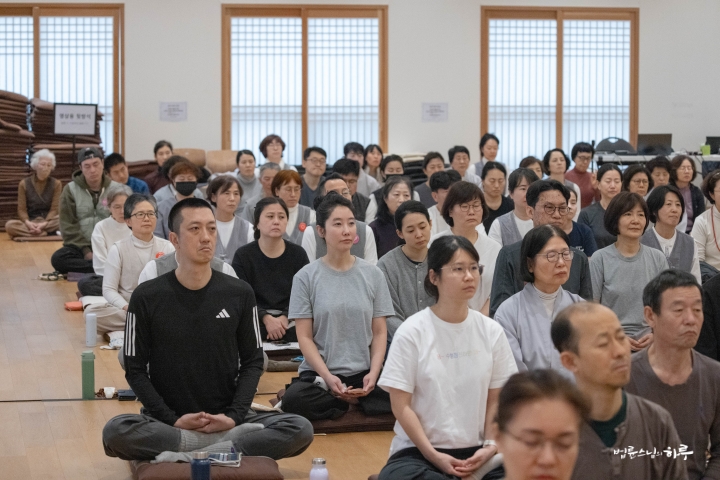
When It Gets Difficult, Excuses Arise
The same applies to dedicated practice. When performing 1,080 bows, repeatedly prostrating and rising, it feels easy at first, but as time passes and fatigue sets in, various afflictive thoughts arise. At that moment, you must choose whether to be carried away by these thoughts or to observe them directly. By acknowledging, “As I get tired, these thoughts arise,” or “These excuses are emerging,” you can avoid being swept away by afflictions. When facing difficulties during practice, emotions deeply hidden in your mind begin to surface. They tempt, threaten, and create all kinds of interference. At such times, it’s important to directly observe yourself.
Practicing 1,080 bows allows you to experience consistency in your commitments. Instead of being carried away by thoughts of difficulty, you simply prostrate once and rise once, then repeat. During this process, you may reflect on yourself, remember forgotten matters, feel gratitude, or suddenly experience surges of indignation—witnessing all kinds of emotions arise. After completing the 1,080 bows, all the afflictions that emerged during practice feel like a dream. What seemed significant in the moment becomes nothing in retrospect. Therefore, think “Even if storms come, they will pass,” and don’t get caught in the moment. This steady progress is what we call diligent practice. When the Buddha was entering nirvana, he emphasized the importance of diligent practice, saying, “The world is impermanent. Practice diligently, like water drops piercing through rock.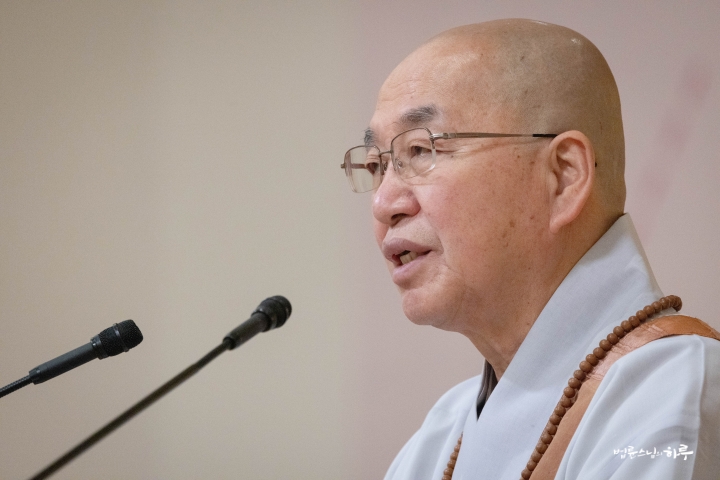
The Path to Freedom from Afflictions
In Buddhist practice, 108 prostrations are commonly performed. These 108 prostrations symbolize the elimination of 108 afflictions. In Buddhism, the suffering of birth, aging, illness, and death is referred to as the “Four Sufferings.” When four mental sufferings are added to these, they become the “Eight Sufferings.” These additional four are: the suffering of separation from loved ones, the suffering of meeting those we dislike, the suffering of not getting what we want, and the suffering of impermanence when we desire permanence. When we further categorize other forms of suffering such as anxiety, unease, hatred, resentment, arrogance, and various afflictions, they total 108. This is how the ancients conceptualized the types of afflictions we experience in our lives. Hence, they are called the 108 afflictions. However, in reality, there are far more afflictions. They are sometimes described as 84,000 afflictions, indicating their countless nature. The reason we perform 108 prostrations is to free ourselves from these afflictions. With each prostration, we aspire for these afflictions to disappear. The 1,080 prostrations practice involves repeating these 108 prostrations ten times. 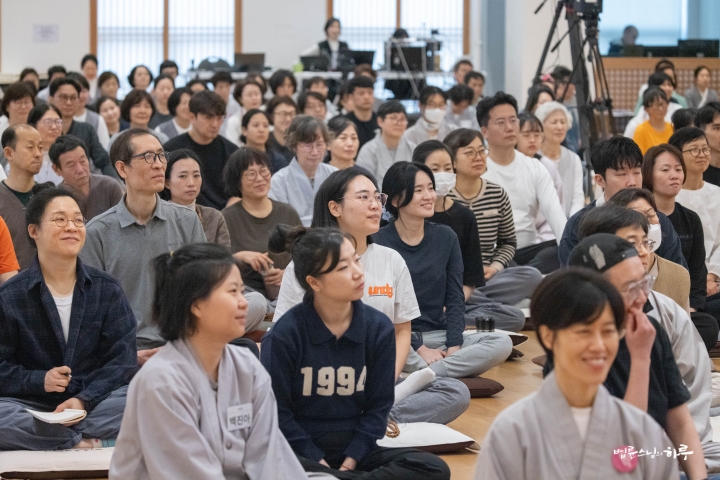
From a personal perspective, prostration is practiced to free oneself from afflictions. In a religious sense, it is an act of reverence to the Buddha. It is the act of bowing down at the Buddha’s feet out of respect. This is why some people perform 1,000 or 10,000 prostrations, symbolizing bowing to 1,000 or 10,000 Buddhas.
Regardless of why you prostrate, it requires physical effort. When you exert yourself, hidden afflictions from your unconscious mind tend to surface. So even though prostration may be physically demanding, please continue your practice diligently without being swept away by these arising afflictions, striving to remain free from them.” 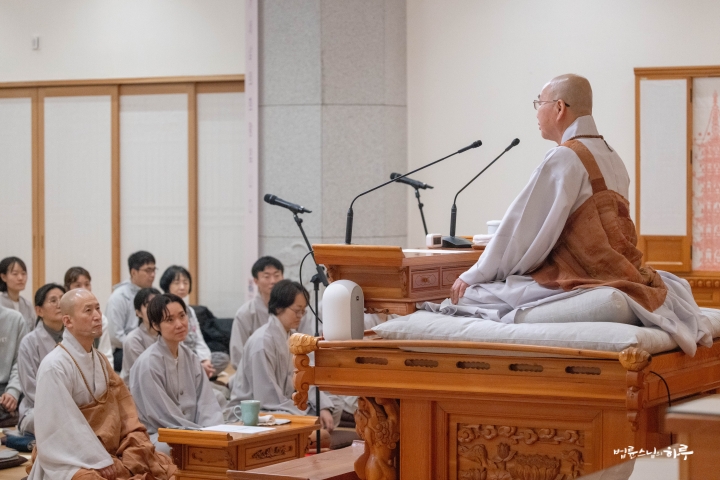
Next, Sunim began the 1,080 prostration practice.
“Avalokitesvara Bodhisattva, Avalokitesvara Bodhisattva, Avalokitesvara Bodhisattva…”
Everyone chanted vigorously in rhythm with the moktak (wooden instrument) while performing prostrations. With each bead of the prayer beads that moved, beads of sweat formed on their foreheads.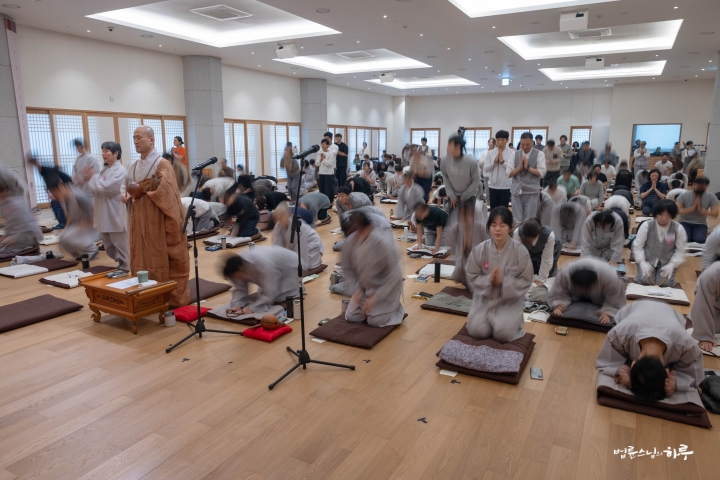
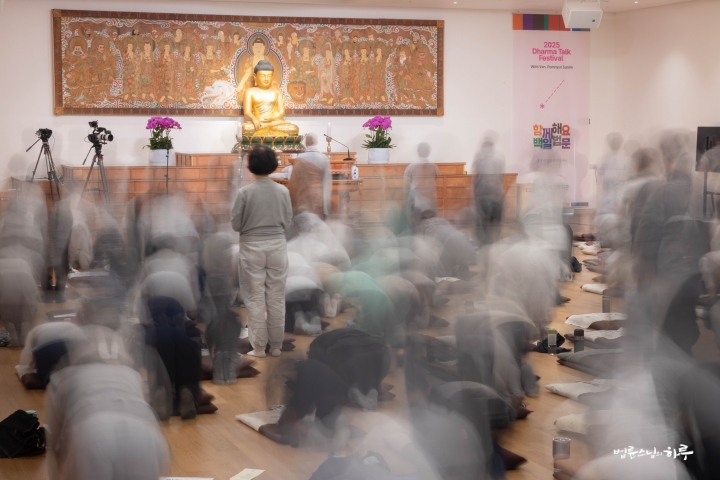
With the continuous sound of the moktak resonating throughout, it took three hours to complete all 1,080 prostrations. With bodies drenched in sweat, they concluded the practice by reciting the Four Great Vows.
“May you attain enlightenment.”
After lunch, at 3 PM, Sunim conducted the Balsim Practitioner ordination ceremony for those who had completed the leading member education over the past year.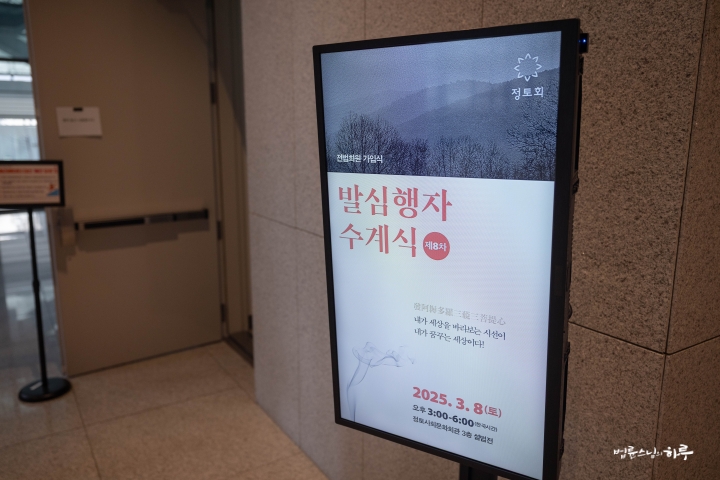
The ceremony began with bell ringing, homage to the Buddha, and the Heart Sutra recitation, with a total of 156 participants gathered at the Dharma Hall on the third floor of the Jungto Social and Cultural Center, at main temples nationwide, and online.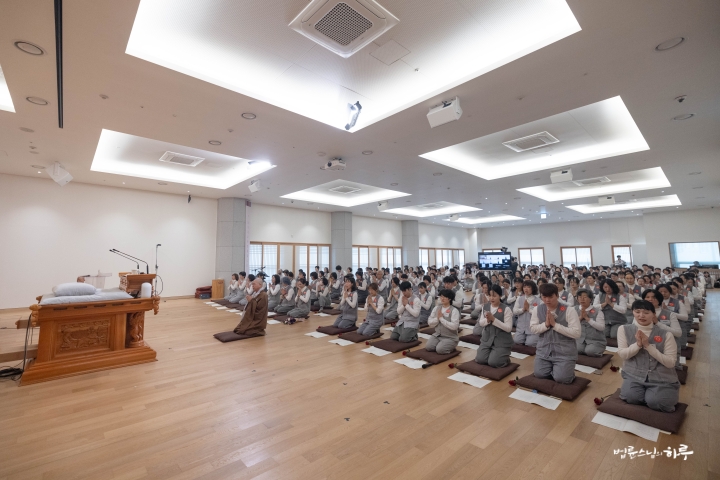
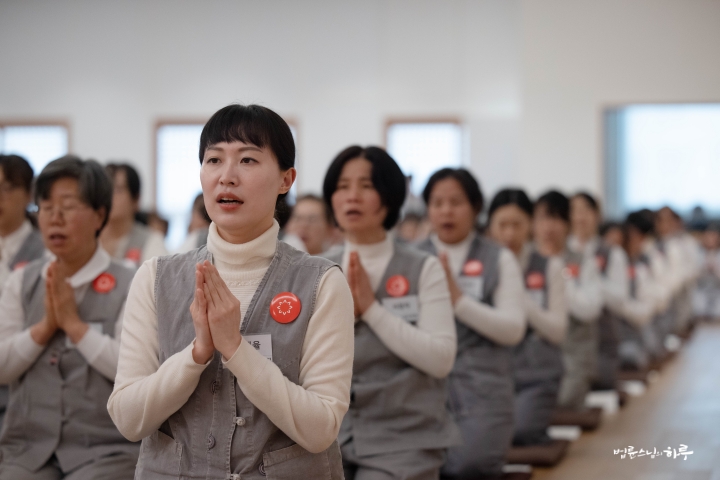
After watching welcome videos from each branch and a progress report video, Kim So-young presented her practice testimony as a representative of the ordination recipients.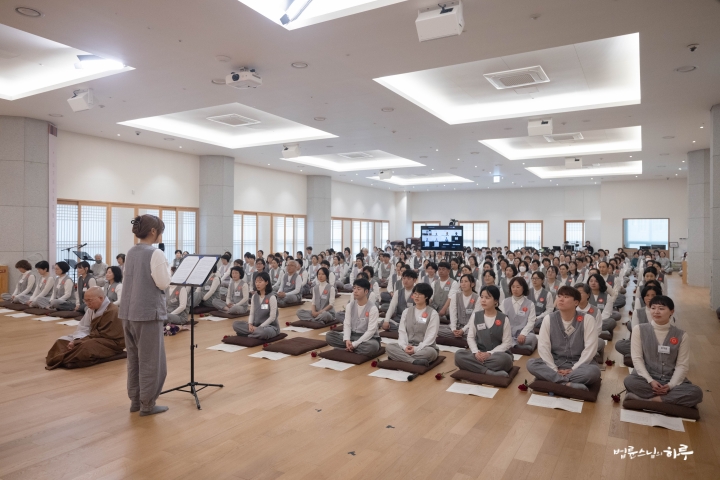
“I was introduced to Jungto Society by an acquaintance and graduated from the Buddhism Course and Sutra Course, and was then recommended for the leading member education. Looking back at the difficult times during my practice, I was able to recognize how much I had struggled. I recalled moments when I insisted on being right and put myself first. I prostrated in repentance to my husband and children, often with tears. My husband had mentioned more than ten times how he used to go to school crying because his parents fought so much. Only then did I truly feel in my heart the burden he carried on his shoulders—having to support his family elders and father, and having to arrange his father’s funeral at an early age. When I finally sensed his heavy responsibilities and loneliness, I felt deeply sorry for treating him like he was invisible—not speaking to him for a month or even three months when I was angry. Gradually, my resentment and blame toward him disappeared. As I let go of my attachment to my husband, my heart became incredibly light. I began to free myself from suffering bit by bit.
When I first became a co-facilitator for the Buddhism Course, I was so focused on my own tasks that I couldn’t really hear what the students were saying. As I became more comfortable in the role, I could recognize the unique sufferings each student carried, and I felt a shared sense of fulfillment watching them transform toward lightness. Above all, what I appreciated most was being able to correct my perspective on practice by listening to the Dharma talks again and practicing alongside the students. Now I can recognize my suffering more quickly and understand its causes. I’ve developed a grateful heart and can live more positively. Although traces of my past self—depressed and lethargic—still remain, I’m gradually gaining the strength to return to a free and happy life. I want to continue steadily on this path with my fellow practitioners.”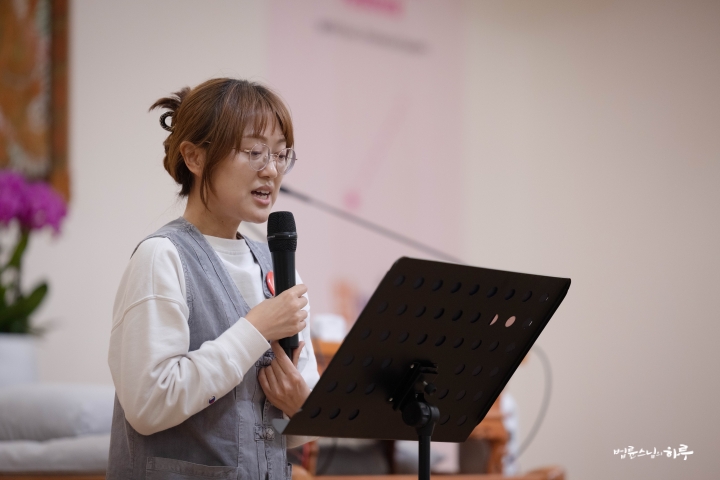
Everyone responded with enthusiastic applause to her sincere practice testimony.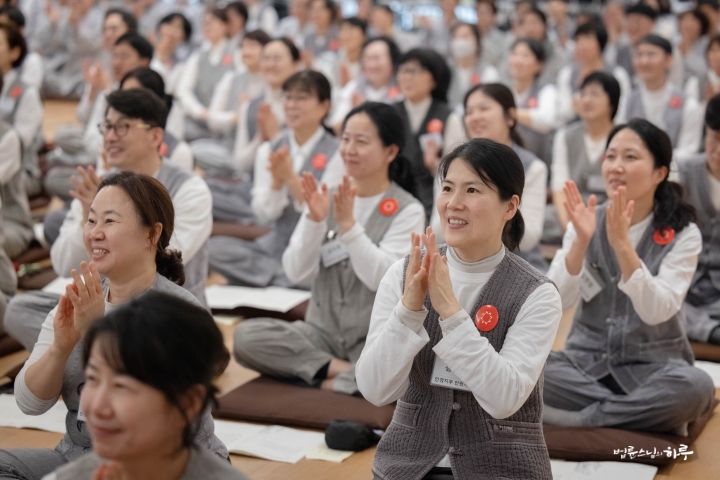
When the new Balsim Practitioners requested the Dharma with three bows, Sunim explained the meaning of the Three Refuges and Five Precepts, then spoke about the practical principles they should uphold as Balsim Practitioners.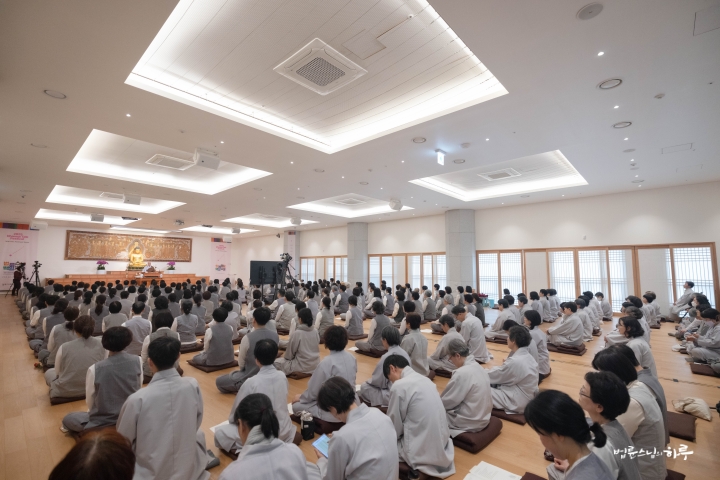
“The Buddha awakened from ignorance by himself and reached a state of freedom without suffering or bondage. This is called liberation and nirvana. Therefore, a disciple of the Buddha is someone who aims to reach the state of liberation and nirvana just like the Buddha. A person who progresses toward a free life without suffering is called a ‘practitioner.’ Thus, a Buddhist is both a disciple of the Buddha and a practitioner. One who follows the Buddha’s teachings and advances toward Buddhahood is called a Bodhisattva. A Bodhisattva is one who has resolved to attain supreme enlightenment (Anuttara Samyak Sambodhi). In short, they are ‘one who has aroused the aspiration.’ Today’s ceremony is where you receive the precepts and become Balsim Practitioners. From today, you become Bodhisattvas—practitioners who have first aroused the aspiration for enlightenment. 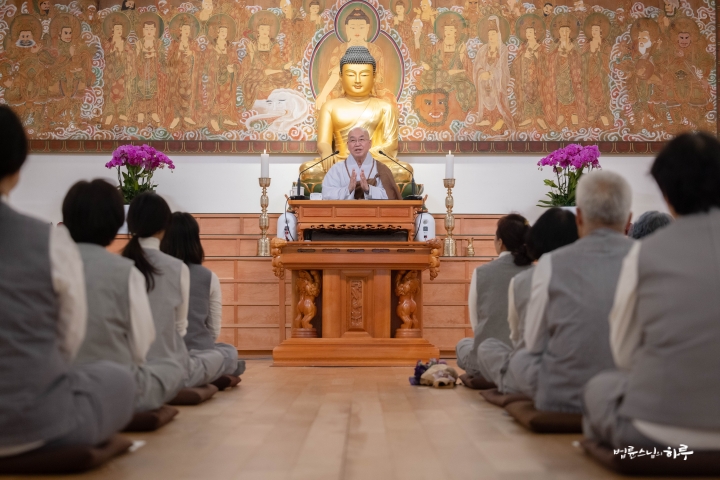
Balsim Practitioner Ordination Ceremony, Becoming One Who Has Taken Precepts and Made a Determination
A Buddhist is one who takes refuge in the Three Jewels—Buddha, Dharma, and Sangha—and practices the threefold training of precepts, meditation, and wisdom. If practitioners abandon the precepts, which are the fundamental values they must uphold, their identity as practitioners disappears.
In the world, each region or organization has its own rules and values. These contents differ from one another. This raises the question of what values are universally agreeable to all humanity. The Buddha always emphasized universality. The core of the Buddha’s teachings consists of two aspects: “Is it right?” and “Can it be applied universally?” This is summarized as “universal validity.” The highest enlightenment among universally valid awakenings is called “Anuttara Samyak Sambodhi” in Sanskrit.
Therefore, those who have received precepts and become practitioners must observe five universally valid precepts. First, they must not harm living beings. Second, they must not cause harm to others, meaning they must not steal or take others’ possessions. Third, they must not sexually harass others. Fourth, they must not harm others with words, such as lying or using abusive language. Fifth, they must not harm others by being intoxicated with addictive substances. These five are the most fundamental precepts in Buddhism, known as the “Five Precepts.” 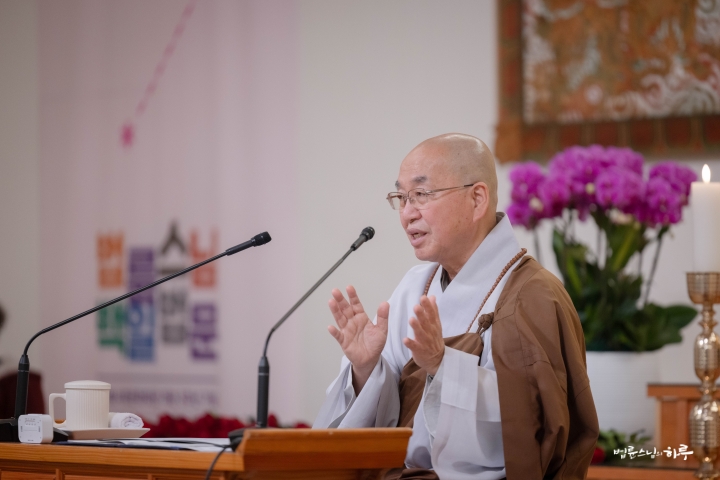
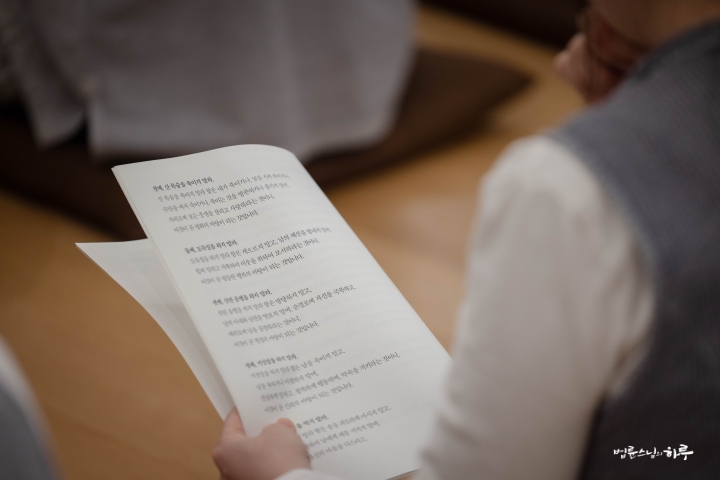
With Such People, There Is No Fear
When you observe the Five Precepts, fear and anxiety in human relationships disappear. If someone is a practitioner who has taken the precepts, you can be assured that they will certainly not assault you when you associate with them, will not cause you financial harm, will not sexually harass you, will not use abusive language or tell lies, and will not get drunk and cause trouble. This makes human relationships comfortable. If a teacher is a Buddhist practitioner, students can’t help but like them, and if a boss is a Buddhist practitioner, employees would cheer. That’s why it’s important for our society to have more such people. It’s not just about increasing the number of Buddhist followers.
Are there no Buddhists or Christians among thieves or swindlers? While there might be slight differences in distribution, it would probably be similar to the religious distribution in the world. Whether one goes to a temple or a church, or whatever religion one believes in, there is actually little difference. That’s why it’s not important to have a large number of Buddhists or Christians.
At the very least, a Buddhist should not rationalize hitting or killing people, and should not steal or take away property necessary for someone’s basic survival. They should not sexually harass anyone against their will, nor should they verbally abuse or lie to others. It would be good if there were no drinking culture, but even if there is, practitioners should absolutely not drink to the point of intoxication. It is extremely important for our society to have more people who uphold these universally valid values.” 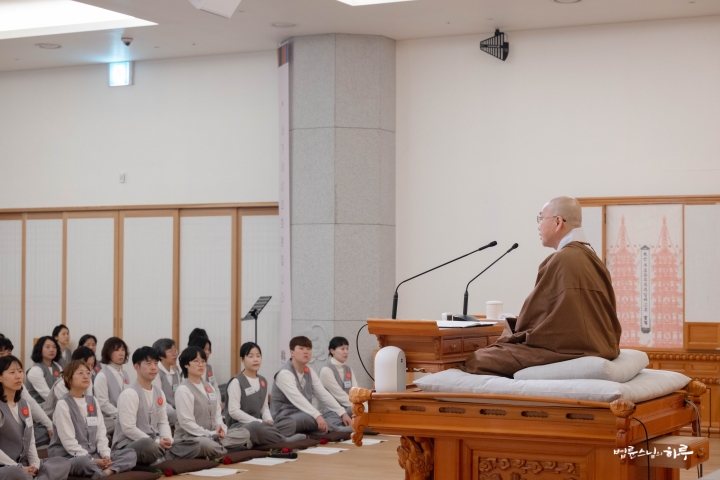
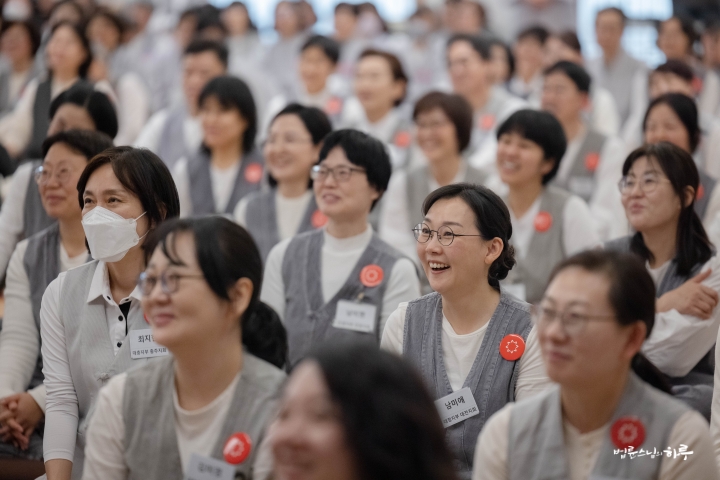
The ceremony continued with repentance, prostrations, and precept vows.
“We, the disciples receiving the precepts, repent with the utmost sincerity. From time immemorial until today, before knowing the Buddha’s teachings, we have committed countless transgressions through our bodies—killing, stealing, sexual misconduct, and other physical misdeeds. Now, we discipline our body, speech, and mind to repent with the utmost sincerity.”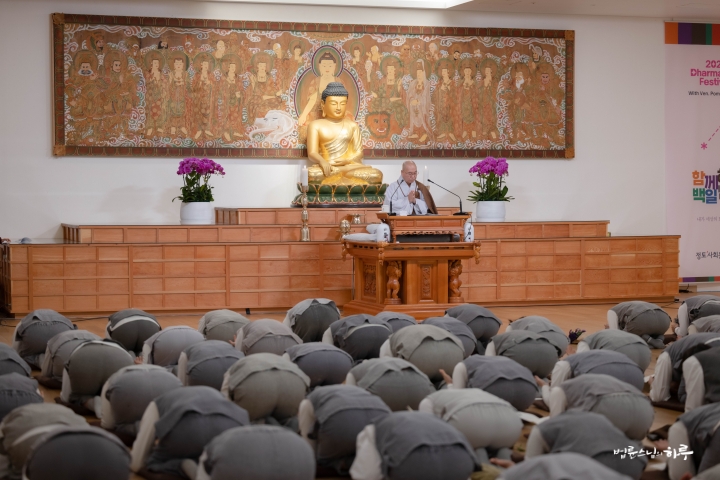
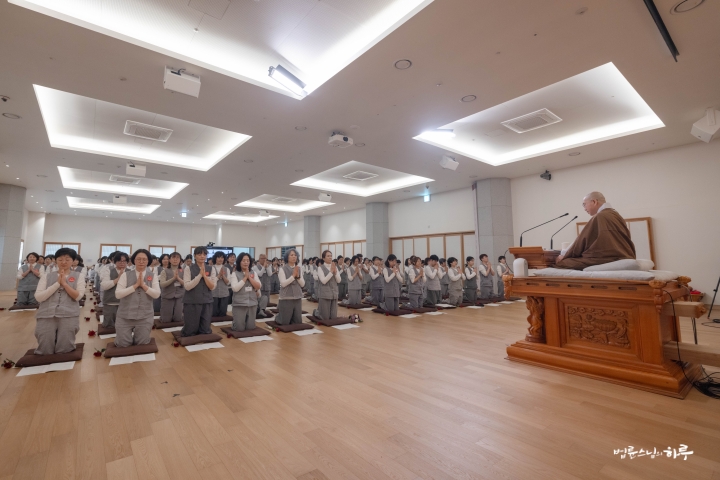
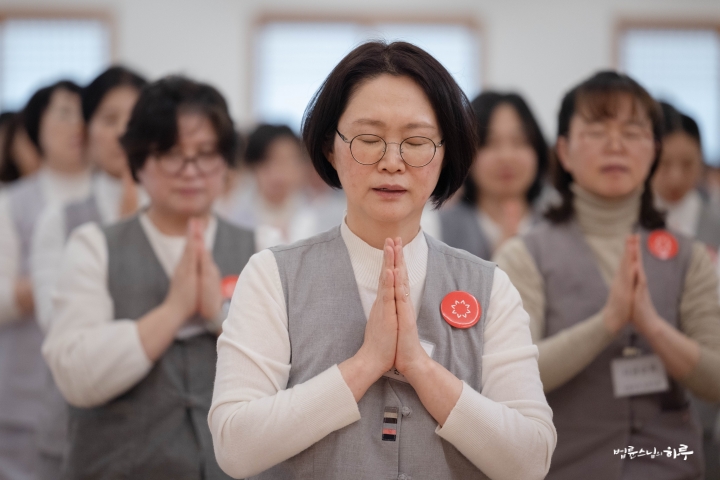
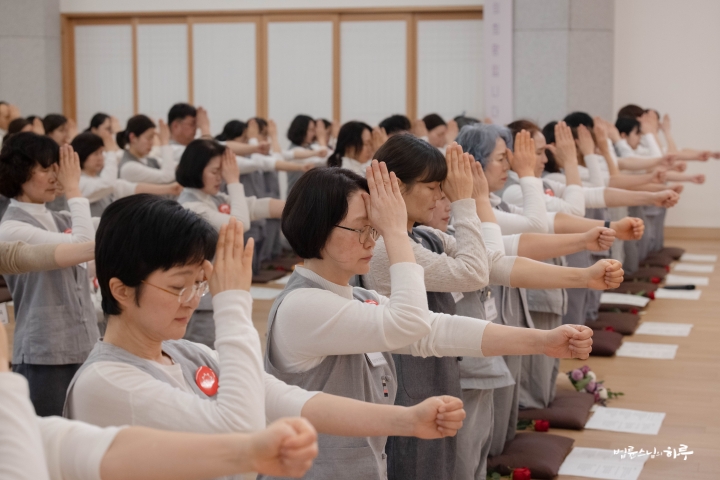
Those who promised to uphold the Five Precepts approached the altar to offer flowers.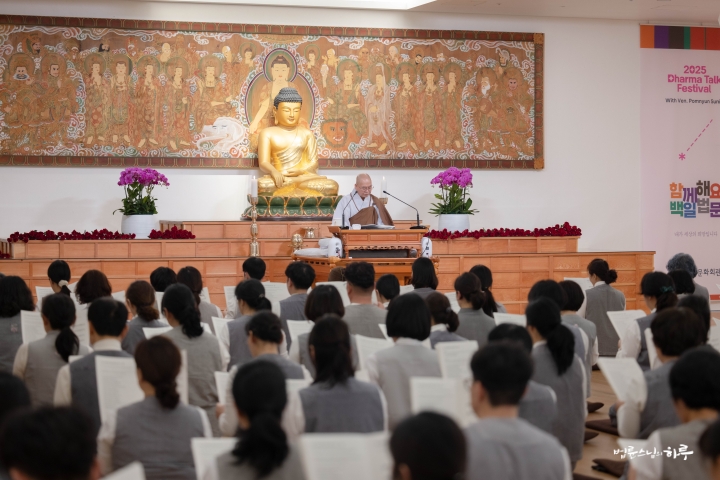
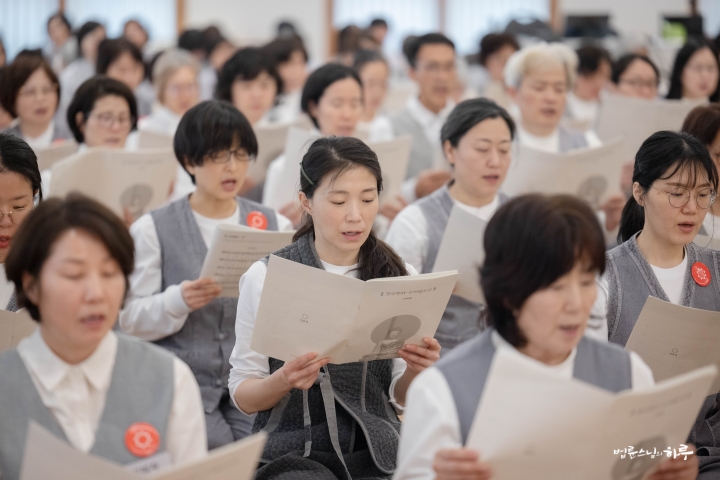
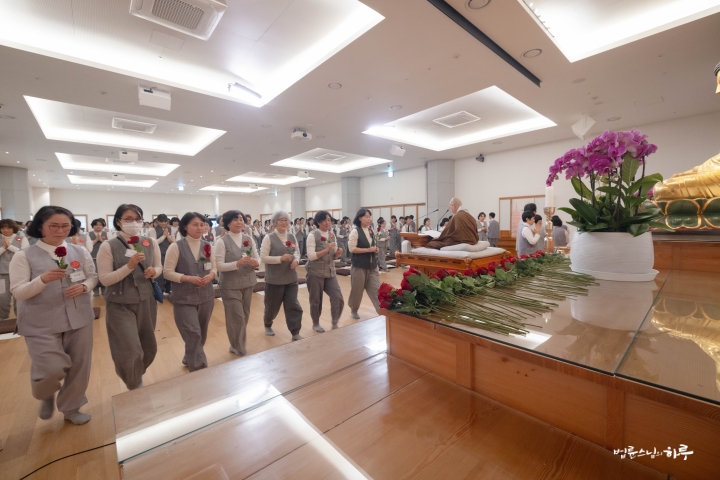
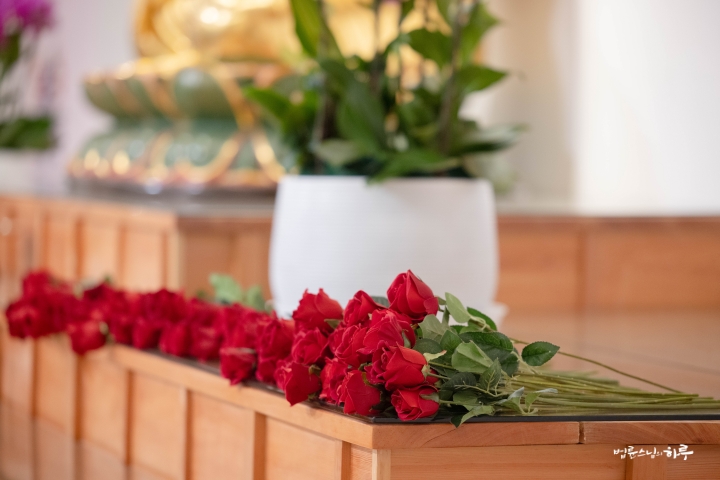
Sunim offered a heartfelt prayer for the Balsim Practitioners who were beginning their new journey as lead volunteers.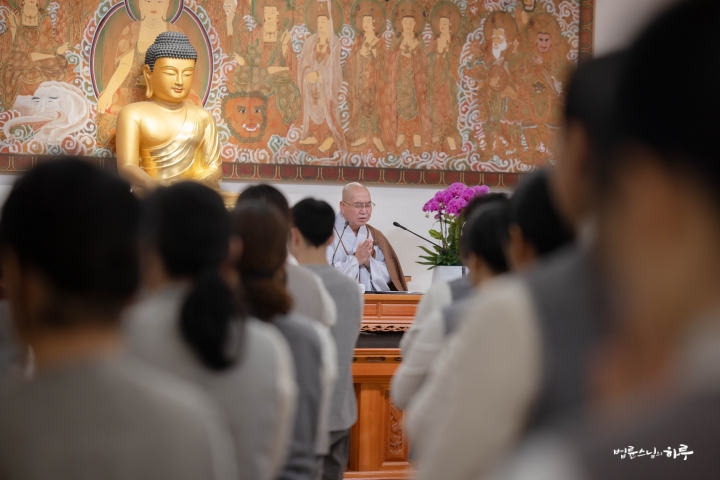
Next, the precept certificates were presented. Sunim handed a certificate to one representative in person. He then presented certificates virtually to those participating online.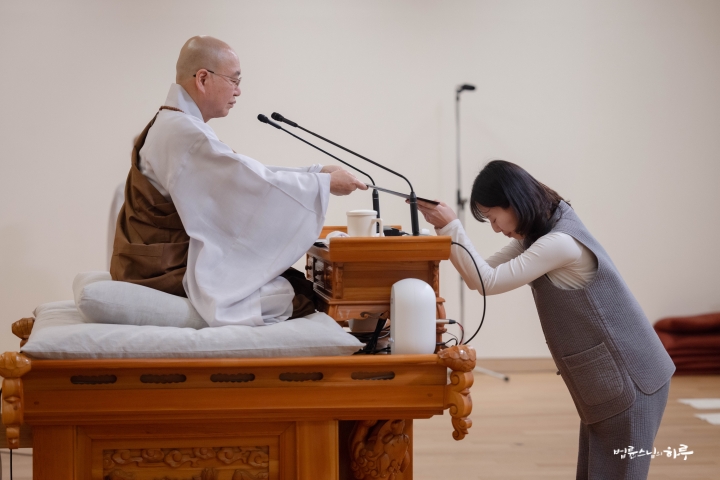
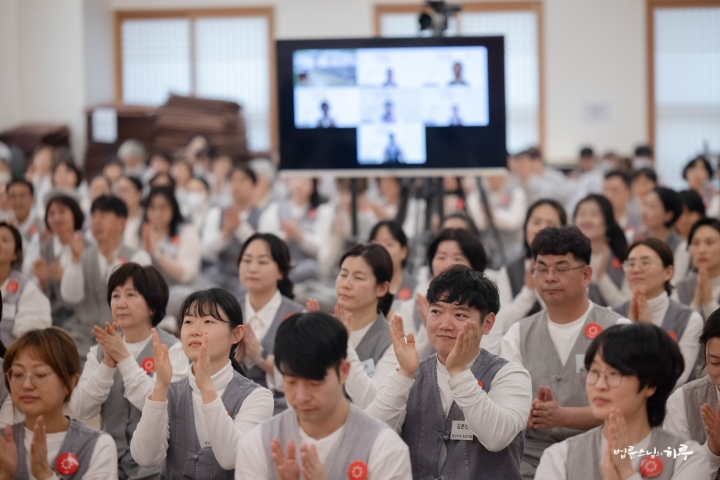
Following this, the Dharma Teachers presented certificates to each participant individually.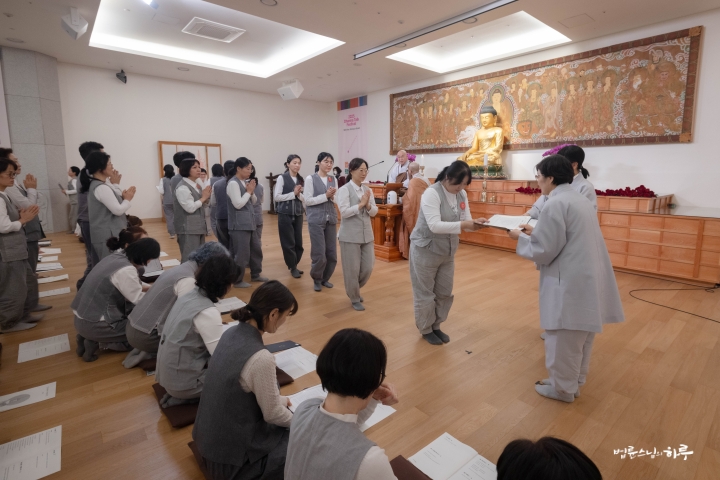
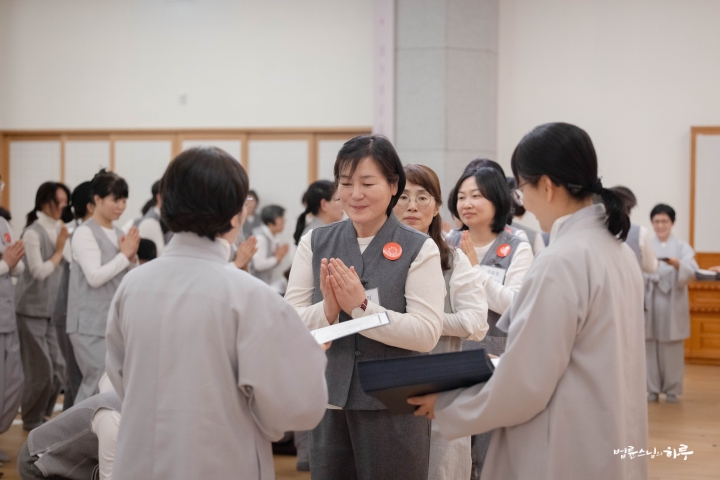
After all participants had received their certificates and returned to their seats, Sunim explained the meaning of receiving a Buddhist name and offered words of encouragement.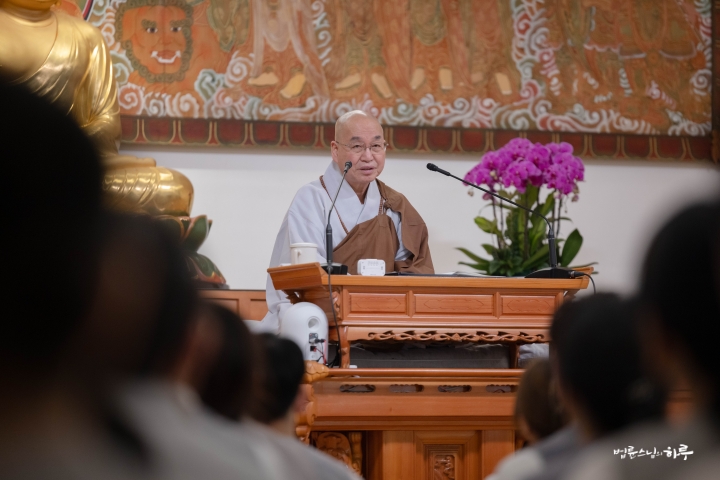
“A Buddhist name (Bulmyeong) means ‘the name of Buddha.’ Receiving a Buddhist name has two meanings. First, it signifies that although I am not a Buddha now, I am making a vow to become one in the future. Second, it means receiving in advance the name by which I will be called when I eventually become a Buddha. This is called ‘receiving a prediction.’ So receiving a Buddhist name is like making a reservation: ‘You will become a Buddha in the future, and this will be your Buddha name.’ It’s like joining the Buddha club. (Laughter) 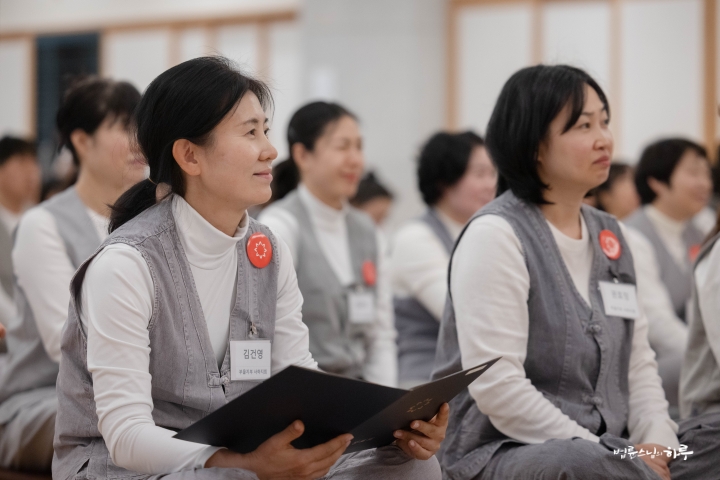
Those Who Have Vowed to Become Buddhas
You are currently provisional members. A provisional member is called a Bodhisattva. You become a Buddha only after attaining enlightenment. So for now, you should add ‘Bosal’ (Bodhisattva) after your Buddhist name. For example, if you received the Buddhist name ‘Daedeung,’ you would be called ‘Daedeung Bosal.’ Then, when you attain enlightenment, you will be called ‘Daedeung Yeorae-bul’ (Tathagata Buddha).
People often think that Buddhist names are created based on the number of strokes in the characters or according to one’s fortune, but that’s not the case. A Buddhist name is not created; rather, it is a Buddha’s name that already exists and is received. After making a vow to become a Buddha and going through the appropriate procedures, you form a connection and receive your Buddhist name. So from today, it’s good to call each other by your Buddhist names. Whenever you hear your Buddhist name, you should be aware that ‘I am someone who has vowed to become a Buddha’ or ‘I am a Buddha.’ 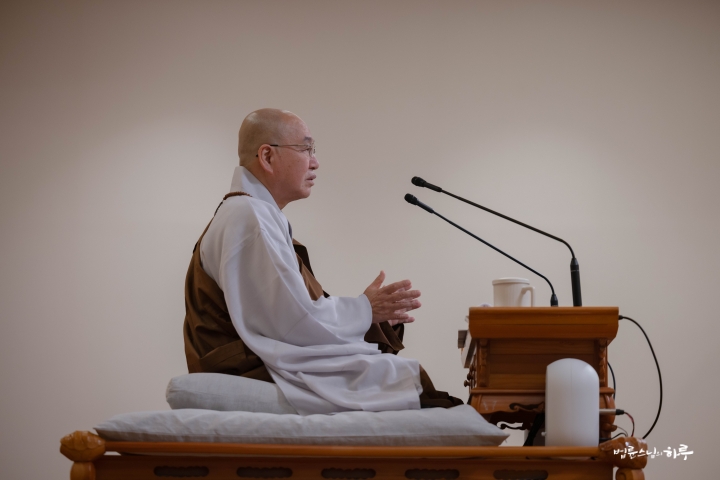
For example, if someone asks, “Could you please do this for me?” you can refuse by saying, “I’m too busy.” However, if someone addresses you as “Daedung Bosal (Equality Bodhisattva), could you please do this for me?” you should respond, “Yes, I will.” When called by a Buddhist name, one should become aware, thinking, “I am a Buddha” or “I am someone who has vowed to become a Buddha.” Since calling someone by the Buddha’s name is a form of Buddha recitation, the person who calls gains merit. As all Buddhist names are derived from the Buddha’s titles, the caller accumulates merit, and the one being called develops self-awareness. Therefore, it is beneficial for practitioners to address each other by their Buddhist names from now on. 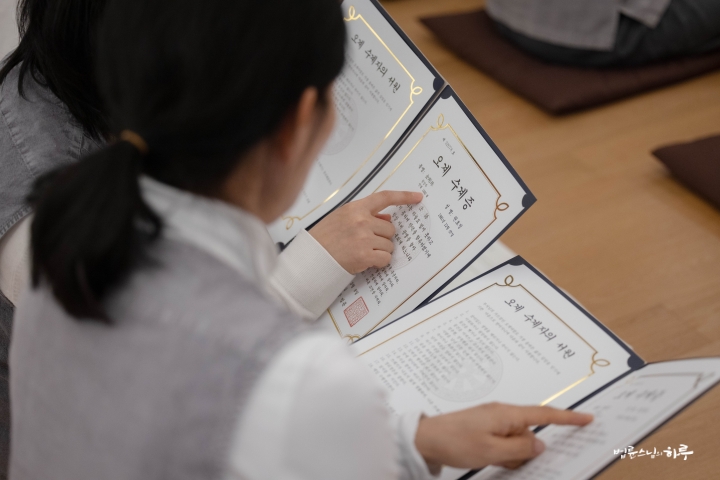
You Are the Core Volunteers of Jungto Society
Now that you have received the precepts, you have become leading members of Jungto Society. The primary role of a leading member is to facilitate the Jungto Dharma School. You may serve as a co-facilitator once more if you need additional practice. However, the purpose of training leading members is to secure volunteers who can facilitate the Jungto Dharma School. Therefore, those who lack the capacity to facilitate the Jungto Dharma School cannot become leading members. If for any reason you cannot facilitate the Jungto Dharma School, you can still participate in Jungto Society activities as a general member or an engaged volunteer.
You have now become core members of Jungto Society. Jungto Society is sustained through your practice, giving, and service. From now on, all Jungto Society projects will be shared at the Leading Members’ Assembly, and you will have the right to access detailed information. Please carry out your activities with pride as core volunteers of Jungto Society. 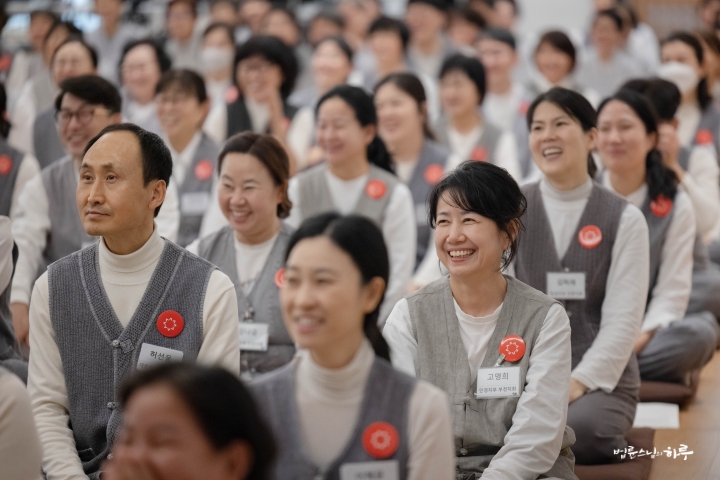
After completing the precept ceremony with the Four Great Vows, everyone gathered for a commemorative photo.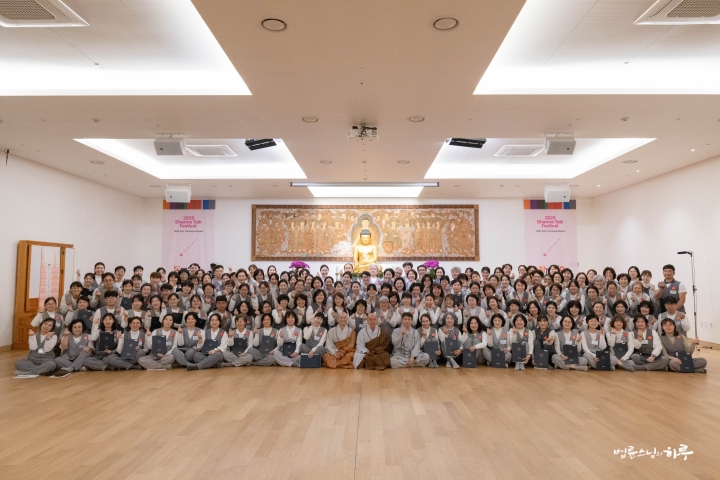
The Balsim Practitioners who received the precepts continued with the second part of the program, sharing their thoughts and feelings.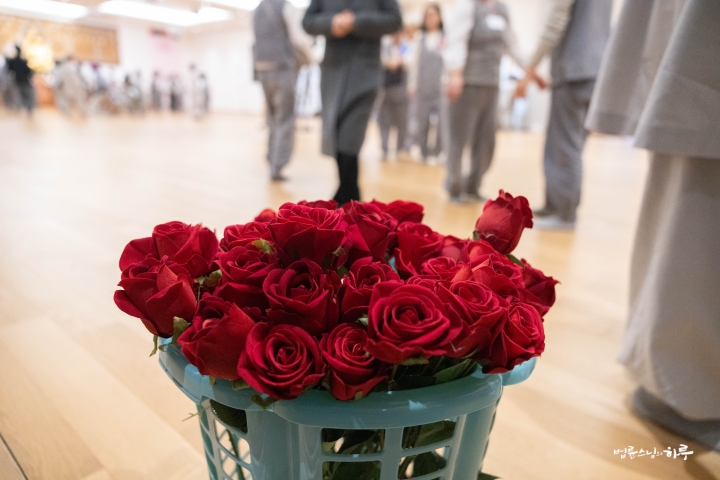
As the sun set, Sunim spent the evening indoors, handling administrative work and proofreading manuscripts before concluding the day’s activities.
Tomorrow will be the 21st day of the 100-Day Dharma Talk. In the morning, Sunim will meditate with the Sangha at the Jungto Social and Cultural Center. In the afternoon, before beginning the main courses of the 100-Day Dharma Talk—the Buddhism Course, Sutra Course, and Buddhist Social Studies—there will be an opening ceremony for all participants.
When Anger Rises at the World’s Injustices, How Should We Manage Our Minds?
June 29, 2025 - INEB Day 4, Discussion on Practice, Organizational Management, and Dharma Propagation




